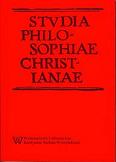Subjectivity and objectivity in post-conciliar views on morality
Subjectivity and objectivity in post-conciliar views on morality
Author(s): Rafał CzekalskiSubject(s): Philosophy, Ethics / Practical Philosophy
Published by: Wydawnictwo Naukowe Uniwersytetu Kardynała Stefana Wyszyńskiego w Warszawie
Keywords: subjectivity; objectivity; John Paul II; autonomy
Summary/Abstract: The purpose of this article is to draw attention to the differences in the perception of subjectivity and objectivity in the two perspectives of Catholic ethics dominant after the Second Vatican Council. Both ethical currents, i.e. autonomous ethics (Autonome Moral) and the ethics of faith (Glaubensethik) developed during the intensive theological study period around the time of the Council. The representatives of both currents interpreted some of the Council’s concepts quite differently, which also led to different results. The concept of subjectivity is closely associated with the understanding of the role and importance of conscience, while the concept of objectivity with the theory of normativity. Many eminent theologians and philosophers took part in the discussion around these fundamental issues for moral theology, among others: A. Auer, J. Ratzinger, Hans Urs von Balthasar, B. Stoecke, J. Fuchs, B. Häring, D. Mieth and others. There was also the voice of the pope at the time, St. John Paul II, who in the enc. "Veritatis splendor" outlined a framework for the further development of moral theology, critically referring to some contemporary ethical projects.
Journal: Studia Philosophiae Christianae
- Issue Year: 51/2015
- Issue No: 3
- Page Range: 83-97
- Page Count: 15
- Language: English

